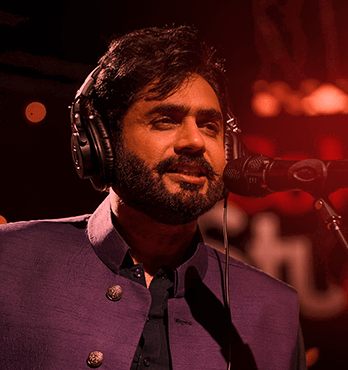Abrar ul Haq

by Ayesha binte Rashid
Abrar Ul Haq is a soft-spoken man and his presence on the Coke Studio set is as calm as it is larger-than-life in his music. He politely greets all the house band members, making it a point to acquaint himself with the backing vocalists who will join him while he sings his song. He smiles at anyone he interacts with and when a team member tells him that his concert was the first one they had ever attended as a child, he delightfully replies, “Aray wah, thank you, thank you”– as if his fans have not told him similar stories many times before and as if thousands of Pakistanis haven’t grown up listening to his songs.
Abrar was propelled into music, and fame, with a chance thought that struck him during an evening walk but developed into a lifelong calling - the thought of his first song Billo which turned into an instant hit and made him a star overnight. With its iconic lyrics and memorable musical composition, Billo firmly cemented itself in the nation’s popular culture when it was first released. “My life completely changed because of Billo. I was teaching at Aitchison College,” Abrar remembers, “I had other plans but because of this song I found myself entering this field.”
Born in Narowal, Punjab, Abrar belongs to a landowning family and grew up surrounded by family members who worked in the civil services and the armed forces. But even as a child, his interests starkly contrasted with that of his family’s and he always found himself gravitating towards the melodies and emotions of music. When he had just begun to form his memories, his favourite song was Madam Noor Jehan’s Kende Ne Naina. “My family tells me that when I was a chhotu, that song used to play and I would get up and start dancing to it. Everyone would say that Abrar’s song has come on,” he says laughing at the recollection.
This early love for music followed him through school and he vividly remembers being in the school choir that would be responsible for leading the national anthem during the morning assembly. “It started with Pak Sar Zameen Shad Bad,” he says, “and went onto school competitions in which I would sing naats and national songs.” In college, at Quaid-i-Azam University, he could be found singing with friends in his spare time while “sitting on car trunks.” “When we didn’t have a class going on, we would all gather at Social Huts in Quaid-i-Azam University and sing and really enjoy ourselves.” But he never composed his own songs until Billo came along – and when it did, there was no going back for Abrar.
When Billo was released in September 1995, Abrar had to leave his job as a professor at Aitchison College due to the onslaught of concerts and tours. The fact that he had become famous hit Abrar during a concert on his first world tour: “It was my first concert in Manchester and people were going crazy. They were dancing and they were crying with tears. I couldn’t believe what was happening.”
Songs kept coming to him and, very soon, Billo went from being a single to an album. “I thought okay, this is a phase that’s going on and when it ends, I’ll give my CSS. But when I’d sit to study for the exams, new songs would keep coming to my mind and I’d end up working on those instead. I kept writing songs and albums kept getting made.”
It is a modest way for Abrar, who is widely regarded as the King of Bhangra, to sum up a career that now spans over two decades and countless memorable songs. Today, Abrar manages his musical career alongside an impressive commitment to social work related projects and causes. For Abrar, music is an extension of the good that he is trying to do in the world; of what he is trying to give back for what he has received. Throughout his career, Abrar has made songs that can make people dance and forget about their worries, alongside ballads which talk about deep seated social issues – a deliberate offering that he hopes gives his music meanings that resonate with his audience.
“Music is spiritual and it comes from within a person. Sound can create such a strong impact; this is something you feel in music. You’ll hear something and get goosebumps. If you’re sad, a song can uplift your mood. In a way, it is a cure,” Abrar says, “Music has the power to induce nostalgic feelings and bring you closer to God ... There’s something extraordinary about it.”
